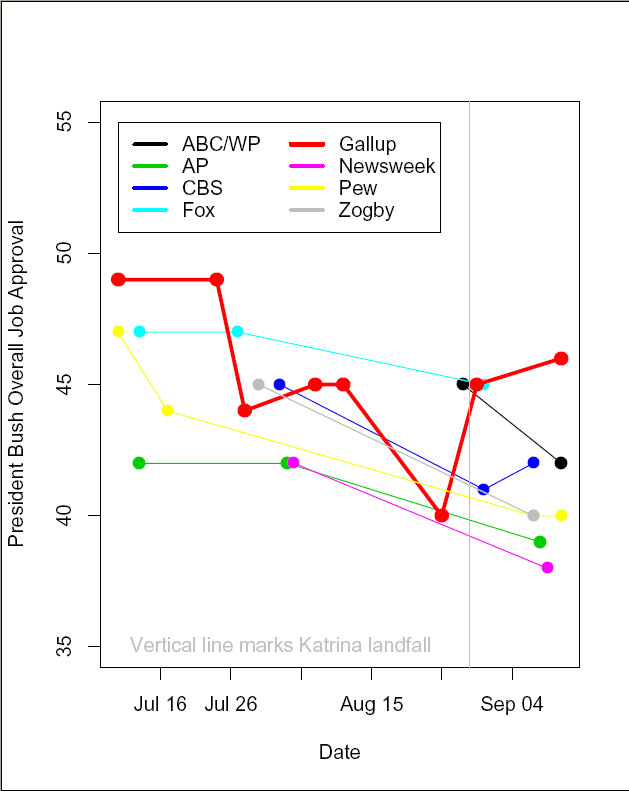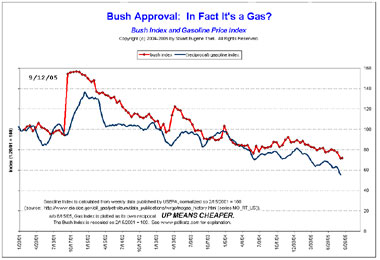On this, MP’s tenth post on reactions to the Katrina Hurricane, he feels compelled to remind readers of the continuing human need. Not that you need reminding. We know from yesterday’s Washington Post/ABC News poll that 60% of Americans say they have already made a contribution for Hurricane relief and another 28% are considering it. If you happen to fall into the latter category, MP hopes you will consider one of the many worthy charities providing relief.
Now, if there is an upside to this tragedy for those of us who study public opinion, it is the rare opportunity to examine national surveys conducted by eight (or more) pollsters at approximately the same time on the same subject. We typically consider polling data one survey at a time, and as we all know, any given survey is subject to the vagaries of random sampling. We often read too much into statistically meaningless results (“Joe Candidate gains a point!”). Even the typical “margin of error” provides only 95% certainty because one survey in twenty will produce a result outside that margin by chance alone. But if we can look at multiple surveys done at the same time, we can start to see past the random noise of sampling error and come to some very firm conclusions. The explosion of surveys over the last week provides just such an opportunity.
As such, I want to take a few posts to review the most clear cut findings consistent across all of last week’s surveys on the reaction to Katrina. Let’s start with one of the questions we have been considering, what has the impact been on the job approval rating of President George W. Bush?
The helpful characteristic of the Bush job approval rating is that most of the pollsters ask it in almost exactly the same way. “Do you approve or disapprove of the way George W. Bush is handling his job as president?” Among those that have released job rating results in the last ten days, Gallup, CBS News/NY Times, ABC/Washington Post, the Pew Research Center, Time & Newsweek all ask exactly that question. AP-IPSOS adds an answer category for those with “mixed feelings” and then probes for whether respondents “lean” toward approval or disapproval. Zogby asks if they “rate President Bush’s performance on the job as excellent, good, fair or poor.” Most of the pollsters also ask the job approval question as the first or second question on the poll, where it is less likely to be influenced by other questions.
Now obviously the surveys conducted last week were not identical. While the field dates were very close, they did not exactly coincide. Minor methodological variation across the various surveys that is largely invisible to consumers (how they train and supervise interviewers, how they select respondents in the household, how the weight the data, and so on) may also introduece some very minor variation into the results. Also, the Zogby survey screened to interview only “likely voters,” the others sampled all adults. Nonetheless, the surveys conducted last week come as close as we ever to taking multiple “snapshots” of public opinion — in this case the Bush approval rating — the same way at the same time.
The best way to consider these surveys is with a chart. Fortunately, with the help of Poli-Sci Prof Charles Franklin (a.k.a. blogger Political Arithmetik), we have just such a chart (created especially for MP’s readers – click the graph for a full size version):

As usual, with survey data, the chart shows the evidence of random sampling error and (possibly) some variation resulting from other minor methodological differences. Yet despite the noise, the lines in the chart tell a clear and consistent story. Every pollster shows a 3-6 percentage point decline in the Bush Job rating since July to the lowest levels measured during his presidency (for the longer-term view, consider the Pollkatz graphic). Why does Gallup, the pollster that fielded the most national surveys (8) since July, also appear to show the most variation? MP has no idea, but the more important point is that even Gallup shows a decline since July.
And the impact of Katrina? Here, as the chart shows, we have fewer surveys to consider, but the three surveys done just before and after the landfall of the Hurricane suggest that Katrina alone has not had much impact, at least with respect to Bush’s overall job rating. CBS and Gallup showed one point improvements in the approval percentage, ABC/Washington Post showed a three point drop (from 45% to 42%). None of these taken together were statistically significant and the direction of the differences were obviously inconsistent.
If Katrina alone doesn’t explain the most recent drop, then consider the continuing bad news from Iraq combined with the big surge in gas prices over the summer. Consider also the following ratings of Bush’s handling of gas or energy policy. They are about as negative as job performance ratings get:
- 72% disapprove “the way Bush is handling the situation with gasoline prices,” 25% approve (Washington Post/ABC, 9/8-11)
- 70% disapprove the way George Bush has been “handling gas prices,” 27% approve (
AP/IPSOS, 9/6-8) - 73% rate Bush’s “handling” of “gas prices” as fair or poor, 21% rate it excellent or good (Zogby, 9/6-7)
- 76% disapprove of “the way George W. Bush is handling gas prices,” 20% approve (Gallup/CNN/USAToday, 8/28-30)
- 60% disapprove “the way Bush is handling energy policy,” 28% approve (Newsweek, 9/8-9)
Professor Eugene Thiel, (a.k.a. Professor Pollkatz), has been arguing for more than a year that Bush’s fortunes closely track the rise and fall of gas prices. His gas-price graphic (which plots Bush’s average job rating against a “reciprocal” gasoline price index in which “up means cheaper”) makes a powerful case for his argument (you can find Theil’s thoughts on this issue on the main page of his site).

More to come . . .
—–
Note: For complete results to the Bush job rating data listed above, see the compliations from the Polling Report or RealClearPolitics (the latter has links) or see my recent posts on these surveys.
Summer work
Given Bush’s current numbers, this may not be the worst way to find a new Justice…
I am surprised that Bush has any support left after the economy for middle class has tanked, jobs are disappearing, cost of living is rising, fuel prices are killing our lifestyles, the deficit is growing daily and will be paid off by our grandkids if they are lucky, Social security is at risk, the health care system is a shambles, we invaded a country that had done nothing to the U.S. and our children are dying for no reason. The 9/11 bombers were from Saudi Arabia and we are still friendly to them because of the U.S company investments there. When are people going to wake up and realize Bush’s Oil/energy company friends and Cheney’s Haliburton associates appear to be the only people making better lives for themselves thru all of this chaos by screwing the American public.
Skip